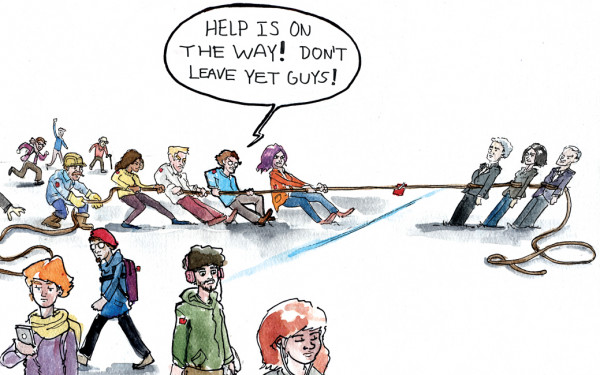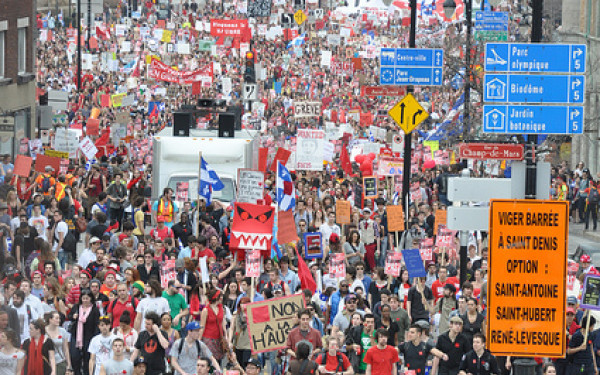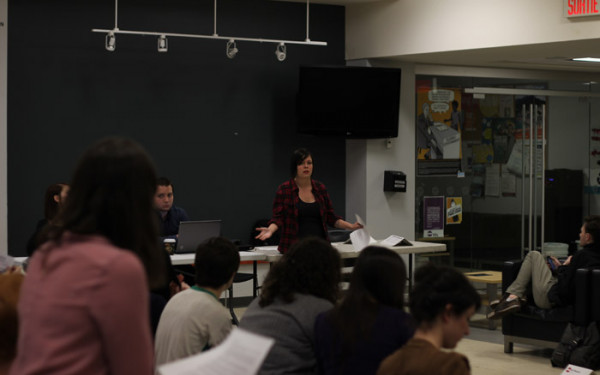We Went to a Montreal Protest Sober and Confused
It was crowded in the metro. A demonstration against austerity was my destination, but it seemed like I was the only one interested. More activism in Montreal—did the average passenger even care?
In Quebec City the day before, a police officer shot a woman in the face, point blank, with a tear gas launcher at the city’s own anti-austerity demo. Cameras captured the scene.
Police violence is normalized. That footage, as well as images of swinging batons and rubber bullets at last Tuesday’s demo in Montreal, as disconcerting as it was, was largely met with shrugs. It’s the way it is; we’re desensitized to it.
I reached Berri station by 7:30 p.m. Around 50 people stood waiting like children in line for new games. Each time I looked up from my notepad, the numbers doubled.
Before 8 p.m., the demo’s official start time, the protest had arrived. The group quickly surprassed the Facebook event’s expected turnout, a sea of mostly white students literally brimming with anticipation.
The police were ready. Dozens of cops in riot gear waited for the protest to begin, posing stoically.
The Montreal police are protesting provincial budget cuts as well. Their personalized, colourful camo pants and the red stickers on their shields are reminders of the cuts to the pensions they were counting on.
Covering demonstrations is tricky. It’s awkward to approach strangers and stick a recorder in their face. Most refuse to speak to press, turning away immediately or knocking my hand out of their face.
My first target, an older man, followed the trend. Wearing a “Quebec un pays” shirt and holding a Quebec flag, he explained to me in French that he cannot conduct interviews in English, despite being fluent. I didn’t get much, but I was able to catch him saying, “We’re in Quebec after all,” as he was swallowed by the protest.
The next protester was hyped and bouncing around. Surprisingly, he wanted to talk. Sporting a ‘90s suncap and baggy pants, with a gold lock as one earring and a gauge to complement it in the other ear, by Montreal protester standards he wasn’t exactly eccentric.
I started out with the basics. “What brings you out here tonight?”
“Very good, man. I’m fucking high on LSD. Fuck the police. Fuck everything. Fuck SPVM,” he shouted into my recorder as I stared at the cross tattoo on his cheek. “I got in a fight with the police—fucking going to jail, man.
“They don’t respect me; I don’t respect them,” he concluded, poetically.
His friend dragged him away, ending the interview. I didn’t see him again.
A couple of snare drummers brought a festive vibe to the crowd. Laurence Corbeil, a younger protester from a CEGEP in Lasalle, was another protester to eagerly agree to an interview, excitedly bouncing around like almost everyone else. It was one of those nights.
Holding a purple sign saying “Feminisme du combat,” she told me she saw the woman get hit by the projectile in Quebec City and that the police acted out of “fear.” I was excited at my continued luck, but then it ran out—the recording didn’t save. A journalist’s worst nightmare.
“They don’t respect me, I don’t respect them.” – LSD guy.
Still, I had her name and a few notes of what she said. Not all was lost. That’s when I saw Richard Beaulieu. We’d met before at a demo against the city’s ultimate cheat code, bylaw P-6. He had been too coy to give me a formal interview then, so I was happy he said yes to one tonight.
Richard is like a human metronome—he recites bylaws and regulations at a predictable rate. With an uncanny physical similarity to a certain actor—one I can’t recall—he criticized P-6, which obliges protest organizers to provide routes to the police in advance and criminalizes covering one’s face at a demo.
“What is the risk of a flag or a mask?” he said of the bylaw. “The authorities are risking violence over something petty.”
Our interview was barely audible as the crowd swelled to peak capacity. The march began as a large man with long straight hair, who can only be described as Thor in a trench coat, raised his communist flag to lead the masses.
They walked through the major downtown hotspots, but the main goal was always Ste. Catherine St. It’s crowded and busy on a Friday night, and this protest is all about sending a message.
The police knew this and did what they could to protect the cherished shopping street. On two occasions, the demo tried to break a police blockade on the street.
On the first attempt, protesters found themselves pitted against a line of cops with bicycles blocking the intersection at Union St. A group in the front holding a large red banner inched closer non-aggressively. Police used pepper spray as a warning. Instead of deterring the frontline, it motivated them. They raised their banner and charged.
Probably freaking the fuck out, the police unloaded. Three editors from The Link were sprayed. The pepper lingers in the air and is like the stinging, tearing sensation of cutting a fresh onion, only times 10.
After going back and forth around the same few blocks, the demo again tried to breach the line of riot police, now at Peel St. Shockingly, the riot police took initiative and charged, banging batons against shields. I bolted in the opposite direction. A flash grenade exploded in the street. Then another.
Chaos reigned. The demo split into smaller factions in all directions. Friends told me Dorchester Square and its lack of lighting was mayhem. I walked around, trying to follow whatever semblance of protest was left. People gave each other a peace sign salute, a nod at their dystopian surroundings.
Eventually two other editors and I got caught in a kettle, despite walking on the sidewalk. The cops let us out after 20 minutes and a lecture. Journalists should leave when they’re told to, they said.
At least 81 people were fined under bylaw P-6. One person was arrested—for assault on a police officer, no less. Your average protester might have the impression that the tear gas-wielding men and women in uniform were the ones doing the assaulting.
But look, at least we’ve balanced the budget.

_900_600_90.JPG)




_600_375_90_s_c1.jpg)